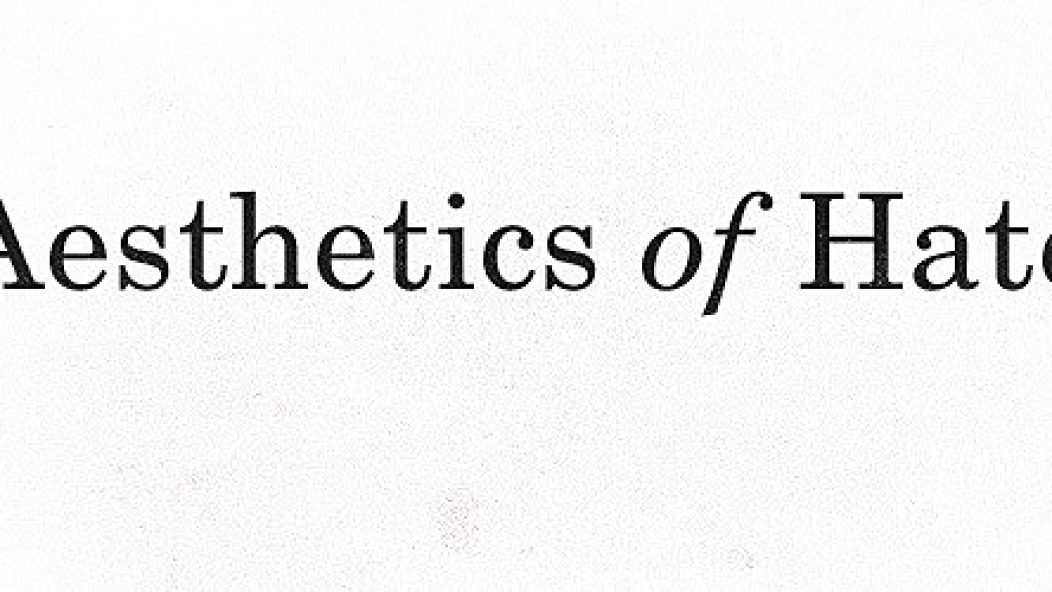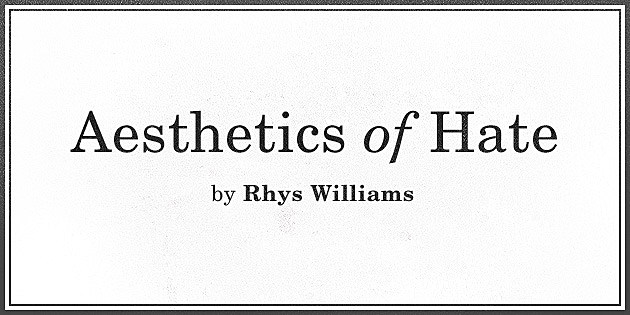
Questioning the Role of Prejudices and Offense Within Extreme Metal
. . .
A month or so ago, in one of my first assignments for IO, I reviewed the latest offering by Graveland, Cold Winter Blades. I had been anticipating a degree of backlash to this review, as it is impossible to review Graveland without someone bringing up Rob Darken’s xenophobic ideology, and so I had ready my usual responses of “I just separate art from artist/I don’t buy any of his records to keep the fascists from getting my money/controversial art is still art/et cetera”. However, I had both severely underestimated the amount of backlash to reviewing Graveland and also had not prepared myself for some serious questions about the ethics of listening to such music.
Some questioned my language in reviewing the piece, claiming that if I had truly wished to concentrate solely on the music, I would have left out politically loaded terms such as “ubermensch”. Others argued that, in the scheme of ethical dilemmas within metal, racist and ethnically charged music posed a greater threat to the outside listener through support of violent, bigoted causes, and that to enjoy such music, even on a mere aesthetic level, was the same as being actively in support of it (after all, by enjoying it, I was vindicating and justifying its existence). Frankly, I was fascinated by the breadth, and frequently depth, of these moral questions, and thus I decided to improve upon my review by fully exploring the questions of how we, as metalheads, approach ethical dilemmas in and surrounding our music. As a result, I decided to explore some of the major questions we, as metal listeners, must ask ourselves and consider when encountering controversial music. My intention is to spark an honest conversation on the matter.
In approaching this conversation, we have to address several factors: whether intent or externality matters in offensiveness, whether personal bias matters, and whether enjoying an aesthetic is in effect an endorsement. In short, we shall explore whether it is truly possible to separate artist from art. Before this, however, are two disclaimers: first, any real-world evidence I may use here (i.e. “female metalheads generally feel like blah blah blah . . . “) are purely based on my own experience. This is not an in-depth sociological study, and thus one should expect inferences based on my own personal experience, not the results of numerous interviews and data collection over the course of several years. Secondly, in using some examples as to implicit, explicit, and potential racism, I have made mention of quite a few offensive terms (primarily the N-word). This was meant to prove a point (and perhaps does so as is regarding privilege, as I am a white male who may not have a good enough cultural excuse to use such a term) and not to be in itself explicit. If the mere mention of such words is offensive and a symbol of how metal often blindly accepts white male privilege; however, please bring it up, for such a response is exactly what I wish to examine in the writing and follow-up to this article.
The first question to examine is whether there is a difference between music produced by those who offend us without intention of offense and music produced with the blatant intent to offend. In other words, is a band whose members are racist, but whose music/lyrics are not as outwardly offensive as a band is clearly, visibly racist? For instance, take Malevolent Creation: a seminal Florida death metal band that have a place alongside Death/Cannibal Corpse/Obituary/et al in the ’90s death metal pantheon and are currently signed on a larger label and touring with major acts. In this interview with the ethically unscrupulous Bill Zebub, Malevolent Creation guitarist Phil Fasciana frequently spouts the term “nigger” and other rather racist phrases such as, “I’ve got a lot of black friends, but they’re not niggers. There’s niggers, and then there’s black people”. However, with the exception of one song, Malevolent Creation are generally apolitical, and especially in the 2000s have toned their controversial content down. On the other hand, we have Arghoslent, whose highly racist stances are openly flouted: their website has a picture of a slave ship as its main icon, and song titles like “Tar-Skinned Pygmoids of the Dense Bush” make it abundantly clear that they’re not especially fond of much of the world’s population. Obviously, it’s easier to dislike Arghoslent because they appear proud of their racist image, but that doesn’t necessarily make it more right. Does the fact that Arghoslent actively seek to offend us make their indignities more heinous, or does the fact that they do so actually make them honest, thereby placing Malevolent Creation in the more culpable spot due to their questionable, but not clearly stated, views? The evidence for either is fairly strong; on the one hand, Malevolent Creation don’t tout the virtues of slavery, but the fact that they’re playing to a wide audience whilst holding racist views gives one pause as to whether or not their “apolitical” music is compromised. This in turn brings up the question of whether they can be excused for saying such crude things as a form of shock, thus placing them among the ranks of artists whose offensiveness is used as mere shock value.
Secondly, do our personal politics have any bearing on how offended we become when we listen to various styles of music? The answer to this one is probably yes, they do. For instance, I personally cannot listen to Leviathan’s music anymore with the knowledge of what Jef Whitehead is accused of doing to his partner. Never mind that Burzum is one of my favorite bands; my gut reaction is stronger towards rape than it is towards murder, and that’s why I can easily listen to Filosofem but not True Traitor, True Whore. My reaction is proportionally stronger in my mind due to the severity of the act, and therefore my personal reaction trumps reason: Whitehead hasn’t actually been convicted of his crimes, and there’s a good possibility that he’s innocent. Varg, by contrast, did it, end of discussion, and yet because I find rape as an act more revolting and inhuman than murder, I subconsciously excuse Varg’s proven deeds and not Whitehead’s alleged crimes. Likewise, as I have heard Christian metalheads attest, those with strong religious convictions are more often offended by anti-religious sentiment than by overt racism or even sexism, even when the racism being promoted is, in fact, more violent and with greater real-world consequences than any anti-religious sentiment could be.
Perhaps this has to do with the varying degrees of privilege enjoyed by each specific listener. After all, there are nearly 2000 years of Christian violence and oppression documented in the annals of history, with virtually no violence relatable to Satanism in any form in comparison; however, a Christian would likely find threats towards his/her/their religion more abhorrent than real life crimes perpetrated by those using the “Christian” moniker. To wit, as a white male whose ancestry lacks a major history of oppression, I have an ethical problem with Arghoslent, but not a visceral one, as they’re not singing about hating my ethnicity. If I were a minority, however, I can imagine that my response would be a lot less tolerant. In addition, we must consider the sliding-scale of ethics from us personally to us generally. It’s a good idea, when confronted with a moral dilemma, to ask, “what actions will satisfy our expectations of ourselves and what will satisfy our expectations of others?” For instance, it’s all well and good that I find (irrationally, as of yet) Leviathan abhorrent, but I wouldn’t hold this true for anyone who likes their music. It might satisfy me to stop listening to a band, but do I find it ethically relevant that others find my positions plausible as well? And, further, where is the line drawn between opinions that only I feel are necessary and those which I feel are necessary for the greater subculture?
That said, it is important to remember that, if metal is beholden to these prejudices, it is as large a part of who metal is as what it is. The metal subculture is, by and large, a white male subculture, and consequently the participant bands frequently get away with things that in other subcultures would be unacceptable. For instance, sexism continues to be an ongoing problem within much of modern metal (just go to Sevared Records’ website and observe), yet most female metalheads I’ve met generally do not seem offended by such vulgarity. I doubt this is because any woman metalhead wouldn’t feel offended by a song like “Fuck Her Head Off”, but rather that the masculine bravado of metal is so pervasive that contrary opinions are often dismissed as being too uptight and out of line. In the metal world, by and large, it is males who get to speak. This is not to say that no-one else does, but heavy metal by far is a male institution. Metal has become somewhat diverse culturally, as evidenced by the growth of folk metal and regional scenes worldwide, but the emphasis is still on masculinity. As noted before, many metalheads will become upset at racism and yet just stand by and bang head at the first mention of “Stripped, Raped, and Strangled”, with little to no cognitive dissonance (and this is an example from personal experience). For those who assume that this problem is simply the result of immaturity, consider the song “Dirty Gore Whore” from Autopsy’s latest album, with its central refrain of “Rape you / kill you”.
Despite throwing punches at the first accusation of racism, it would seem that most proponents of old-school death metal tend to turn a blind eye even to the most brutally misogynistic lyrics; one has barely heard anything but praise over this new Autopsy album (in other words, no intense controversy), and there hasn’t been any sort of accusation of the band members being in any way bad people. Rather, this sort of offensiveness is just business-as-usual. Yet, is this because of the institutional and often organized nature of racist groups as opposed to the pervasive yet simply attitudinal nature of sexism? And furthermore, doesn’t the fact that sexism is so easily embraced and simply skirted over when, in fact, more women are killed each year in sexual violence than minorities are in hate crimes mean that sexism in music is, due to almost ambient nature yet brutal results, more offensive than racism? Third, does the ideological backing of a particular brand of music influence the aesthetic of the music to the point that the listener becomes unwittingly complicit in the ideology, even if only the aesthetic appeals to the listener? This can be obvious in some instances: one would never accuse, say, Boyd Rice of not making his views abundantly clear through his music. However, in some instances it is less obvious. With Graveland, one has to actually think about the music in context of Rob Darken’s political stances in order to fully discern the extent of this influence. Hearing the martial beats and full-bodied masculine singing may leave a taste of Euro-centrism in one’s mouth, but it takes actually hearing the music in terms of Darken’s beliefs to put two and two together.
By the same token, when one listens to, say, “Frontsoldatten” by infamous NSBM act Grom, it’s easy to detect rhetoric in their music alone as well as in their lyrics (opening Nazi sample aside). The music is fast, abrasive, and martial, with strict cadences provoking fascist overtones vindicated by the title. Were I to listen to the music by itself, with no other indicator of its tone, I would still refer to it as being “reactionary”. Aesthetics can determine the seriousness with which ideas or lyrics are taken. However, does said aesthetic make the listener beholden to, and in effect party to, the philosophy of the band?
Reviewing Graveland, I found myself throwing out loaded terms such as “ethnocentrist” and “ubermensch” to describe the music, not because I felt any particular views on such matters, mind you, but because this was simply the response that the music imparted upon me. This could be a personal shortcoming, to be sure, but doesn’t the music at least play some part in what words we use to describe it? After all, you wouldn’t call death metal “brutal” if that was not the case; consequently, if music is either implicitly or explicitly fascist, does it tempt the listener to employ fascist imagery on a subconscious level? And again, there’s that privilege, allowing me to subconsciously justify this choice with “well, I’m not offended”. These arguments are not self-contained.
Can we ever truly separate art from artist? Frankly, I don’t have an answer. I think that, on one hand, most anywhere one looks in metal, one is bound to find something to offend sensibilities. Part of the reason we, as metal fans, gravitate so strongly towards metal that is controversial is because it not only allows us a sense of confrontation that we desire but that it allows us to vicariously live out a darker part of us that we wouldn’t ever want to actually come to bear. On the other hand, it should not be necessary to have to put up with bullshit; simply dismissing things that make me uncomfortable as being “necessary to being human” seems like a cop-out, as I imagine most of us would rather not have to constantly be confronted by things that we despise. We can separate art from artist to the extent that it allows us to enjoy the music whilst remaining clear about our ethics and conscience, but the moment that it starts to affect those (as, perhaps, Graveland did with me and my choice of words) then perhaps we must remind ourselves of what we believe and how these two concepts may not be easily reconciled.
As metalheads, I imagine most of us generally support artistic freedom whilst also not wishing to be in any way threatened or oppressed. Listening to good music that happens to be by people who seek oppression thus puts the engaged listener into a conundrum: Are some values more important here than others? Which one is the better choice, in that instance? Or can we at least recognize that the competing values are, in themselves, good, but limited and then try to determine what the nature is of the limits we perceive? It’s a fine line between pure outrage and necessary confrontation, which makes a conversation on the matter all the more important.
What do you think? Does art trump artist, or can the two never be separated? Who gets to pick and choose what is offensive within metal and what is not? Moreover, can there ever be a middle ground, or are these counterpoints incorrigible? And what happens next if we, as a community, define an answer for any of these questions?
. . .
http://www.youtube.com/watch?v=UWDRHVXDLXk&feature=results_video&playnext=1&list=PL76BA512714A24054
Malevolent Creation – “They Breed”
. . .
http://www.youtube.com/watch?v=7imBe5V9qDc
Autopsy – “Dirty Gore Whore”
. . .
http://www.youtube.com/watch?v=dtOONTRZ9Qw
Grom – “Frontsoldatten”
. . .











